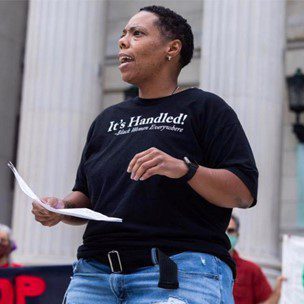December 21, 2021 Community Stories
Can Funders Do Better to Support Nonprofits Led by People of Color? We Asked Tanisha Arena
Arise for Social Justice in Springfield is a member-led community organization dedicated to defending and advancing the rights of poor people. This month, Arise was one of 77 grantees for the Community Foundation’s Flexible Funding program, designed to elevate nonprofits addressing diversity, equity, and inclusion.

Arise Executive Director Tanisha Arena has been at the helm for three years after a career in the corporate sector. Arena shared her thoughts on how philanthropy can better support community-based organizations led by Black, Indigenous, and people of color (BIPOC).
How can foundations and donors better support nonprofits like Arise that are led by Black, Indigenous and people of color (BIPOC)?
Trust us. Trust that we are going to allocate money where it needs to go in the best possible way. Because being under-resourced, being an oppressed group, we know how to stretch a dollar. Listen to the wisdom that has existed in Black and indigenous communities forever. Show up and support. Write a check (and not a little check). Give us the space to talk about and even push back against restrictions to grant programs that may be replicating systems of racial dominance and superiority that we are working to dismantle. Unrestricted funding is great because there aren’t those restrictions. Put your money where your values are.
Explain the meaning behind Arise for Social Justice’s slogan, “Nothing about us without us.”
When you look at the way our society is structured, who are the decision makers? Who are the folks who are sitting at the table? Usually, it’s not the people who look like us — the people furthest away from the power. Black and Brown people, people who are poor and low income, their voices aren’t heard. So the slogan is saying that our voices need to be there. It’s not for an outside person to decide what are the best things for this community; instead, outsiders should ask us what we need.
Arise’s message urges funders to think differently about grantmaking policies for community-based organizations. Tell us what that looks like in solving a problem like homelessness.
To decrease homelessness, Arise deals first with the trauma people are experiencing from having no place to sleep or eat or be safe. Poverty is violence. People in low-income communities are struggling to survive, so we need money to get them the mental health care access they need before we can even think about talking with them about things like financial literacy (which is sometimes the kind of program funders want to invest in). We meet people where they’re at. We talk with people, listen to their story, and navigate — in non-traditional ways and without bureaucracy — to find solutions. Funders need to trust us to use grant money without restrictions so we can actually come up with solutions that have value for people.
What holds the most hope for you as society wrestles with systemic inequalities?
We can solve these things! If we can cultivate connections that cultivate humility, we will not operate in the way that we have. The systemic and institutional structures will topple as they need to. Because if I respected your humanity and we had that connection, would I be okay with gerrymandering? Would I be okay with a criminal justice system that really isn’t? No.
Who are on your boards? Who are your leaders? That matters — for the ideas and gifts and wisdom that come into your spaces. And the money is there to solve these problems; it’s the allocation that needs to change. We can fund the things that create the big changes.
Some responses above have been lightly edited for space reasons.
